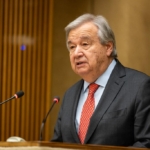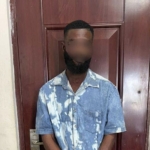
Kwame Baffoe (Abronye), the Bono Regional Chairman of the opposition New Patriotic Party (NPP), a figure known for his loud and often abusive political rhetoric, has been remanded by the Accra Circuit Court over allegations of publishing false news and offensive conduct likely to breach public peace.
While this case should serve as a wake-up call for politicians who abuse platforms to spread misinformation, it also exposes the hypocrisy and double standards of the NPP concerning issues of arrest and bail.
Let us be clear: Abronye’s language and behaviour must be condemned. His repeated use of vile, irresponsible, and politically toxic language on live TV in Ghana—watched by both children and adults—has contributed to the growing culture of political insults and misinformation in the country.
His false claim that the current Inspector General of Police (IGP), Tetteh Yohuno, attended National Democratic Congress (NDC) strategy meetings, and his unsubstantiated labelling of the IGP as the “most corrupt” in Ghana’s history, are not matters to be taken lightly.
But while we condemn Abronye’s conduct, we must also interrogate the NPP’s sudden moral awakening now that one of their own is at the receiving end of the law. Where were these calls for due process and respect for bail rights when critics of the NPP, or NDC sympathisers, were detained without similar support?
Read also: https://www.myjoyonline.com/npps-abronye-remanded-for-one-week/
Bail, under Ghanaian law, is not a favour or a political privilege; it is a constitutional right. The 1992 Constitution of Ghana, under Article 14(4), guarantees the right of an arrested person to be brought before a court within 48 hours, after which they may be granted bail. The purpose of bail is not to determine guilt or innocence but to ensure that the accused person returns for trial.
Historically, Section 96(7) of Act 30 listed certain offences as non-bailable. However, in the landmark case of Martin Kpebu v. Attorney-General, the Supreme Court struck down that provision as unconstitutional, affirming that all offences are bailable, and that the decision to grant bail lies within the discretion of the court, based on:
- Whether the accused is likely to appear to stand trial;
- The nature and severity of the offence;
- The strength of the evidence;
- The potential for interference with witnesses or investigations.
This case overruled earlier decisions such as Gorman v. the Republic, which upheld the non-bailable offence regime. The Martin Kpebu ruling is therefore a watershed moment in Ghanaian jurisprudence, ensuring fairness, the presumption of innocence, and respect for human rights.
As Justice Dotse JSC remarked, the ruling is not a “carte blanche” for granting bail to everyone, but a clarification that no offence is inherently non-bailable—a view that must be consistently upheld across political divides.
What is disturbing, however, is the hypocritical outrage from the NPP, whose top brass believe a wrong is being done now but could not say the same within the last four years. Where were they when Oliver Barker-Vormawor, a fierce critic of the government, was arrested, denied bail, and kept in custody for weeks? Where were they when Ama Governor faced public ridicule and was sidelined from being called to the Bar? Where were they when an NDC branch executive was arrested, denied bail, tried hastily, and sentenced to four years for insulting then-IGP George Dampare?
This was a young man who turned himself in to the police, was arrested, denied bail, and hastily tried under the guise of “expeditious justice” because of his political affiliation. Despite legal attempts and advocacy, he was sentenced to four years in prison and only recently was granted bail pending appeal.
At the time, Godfred Yeboah Dame was still the Attorney-General. He did not speak out against these legal abuses. He did not advocate bail as a right. And yet today, under a different political climate, his silence has been replaced with subtle, politicised attempts to influence public opinion in favour of an NPP party executive.
This is the very definition of political hypocrisy: you cannot call for fair treatment only when your own people are in trouble and remain mute when others suffer similar or worse fates.
I genuinely and wholeheartedly support Honourable Alexander Afenyo-Markin’s consistent call this year for an end to the harmful “do me, I do you” political culture that continues to plague our nation. However, one cannot help but ask: why didn’t he make this call during the previous NPP administration? Was that era entirely free of such political retaliation, or was silence more convenient then? Regardless, we must avoid framing every arrest as politically motivated. Political figures must not be above the law—they must be held accountable when they go wrong.
The NPP cannot position itself as the authority on who deserves arrest or bail. Their hypocrisy and selective outrage have become overwhelming.
The bigger issue at hand is the continued misuse of remand as punishment, a practice that undermines justice. Why should anyone be kept in jail before being found guilty? If, after months in custody, the accused is acquitted or found to have committed a lesser offence, who compensates them for their lost freedom, reputation, or economic well-being?
Lawyer Martin Kpebu must be commended for his consistent and principled advocacy for legal reform and justice for all, not just for the politically connected. His actions have shaped Ghana’s legal landscape and provided relief for countless individuals who would otherwise be lost in the remand system.
This is the kind of leadership and integrity our country needs—not the selective morality of political parties.
In a democracy, the law must apply equally to all, not just those in power. Abronye should be held accountable for his inflammatory speech. But the same justice system must treat him fairly and within the bounds of the Constitution. At the same time, the NPP must reflect on its glaring double standards and work towards building a society where justice is not partisan.
We must end the use of bail as a weapon. Ghana deserves a legal system that respects rights, treats all equally, and resists manipulation by political elites. If we fail to demand consistency today, we may one day be victims of the very injustice we ignored.


